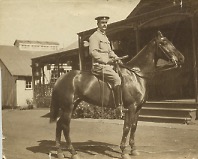A new book by Toddy Hoare will be published by Helion & Company in early autumn 2018.
Reginald Hoare commanded the 4th Queen’s Own Hussars from 1905 to 1909 and was a senior brigadier-general at the start of the First World War, commanding a brigade of Yeomanry regiments including the Royal North Devon Yeomanry, which his late brother had commanded after leaving the Royal Navy, the Royal Devon Yeomanry, the Somerset Yeomanry, the Ayrshire Yeomanry, and the Fife and Forfar Yeomanry, with other attachments. Throughout the war he continued to raise, train and fight this brigade at Gallipoli, in Egypt and Palestine, and finally on the Western Front in France during the second half of 1918, where he was wounded and invalided home in September. Before Gallipoli he wrote to Miss Walker, who was the daughter of a polo friend, and the correspondence continued up to their eventual wedding in October 1918 on his discharge from hospital. Dear Miss Walker includes a background to his pre-war soldiering and exchanges with a bumptious young subaltern, W S Churchill, who was in his winning regimental polo team. Through the social exchanges of the writer and recipient and their backgrounds leading up to their wedding this book provides an interesting social perspective, as well as a vivid insight into the fighting at the respective fronts and the doings of senior ranks on active service. Further insights have been gleaned from the respective Regimental Histories that were written after the First World War, and included where appropriate. Most of the photographs that illustrate this volume were taken by Reginald Hoare himself. Sadly he never spoke about his experiences to his children, so no other record or source relating to his campaigns exist.



Photographs reproduced with permission from Toddy Hoare. Copyright: Toddy Hoare.
